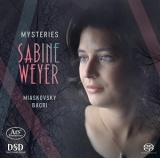 Mysteries; Nikolai Myaskovsky: Klaviersonaten Nr. 2 op. 13 & Nr. 3 op. 19, Excenticities op. 25, Nicolas Bacri: Klaviersonaten Nr. 2 op. 105 & Nr. 3 op. 122, Fantaisie op. 134; Sabine Weyer, Klavier; 1 SACD Ars Produktion 38313; Aufnahme 08/2020, Veröffentlichung 08/01/21 (76’00) - Rezension von Alain Steffen
Mysteries; Nikolai Myaskovsky: Klaviersonaten Nr. 2 op. 13 & Nr. 3 op. 19, Excenticities op. 25, Nicolas Bacri: Klaviersonaten Nr. 2 op. 105 & Nr. 3 op. 122, Fantaisie op. 134; Sabine Weyer, Klavier; 1 SACD Ars Produktion 38313; Aufnahme 08/2020, Veröffentlichung 08/01/21 (76’00) - Rezension von Alain Steffen
Die luxemburgische Pianistin Sabine Weyer liefert uns mit ihrer neuen SACD nicht nur einen weiteren Beweis ihrer großen Musikalität und ihres spieltechnischen Könnens, sondern darüber hinaus ein äußerst spannendes und anspruchsvolles Programm. Es ist erstaunlich, wie gut sich die Werke von Nikolai Myaskovsky (1881-1950) und Nicolas Bacri (*1961) ergänzen.
Der Titel der Produktion lautet Mysteries, in der Tat besteht das Programm aus eher dunklen, dramatischen und hochexpressiven Stücken. Sowohl Myaskovsky wie auch der zeitgenössische Komponist Bacri scheuen nicht davor zurück, die Katastrophe und die seelischen Abgründe in der Musik zu suchen und sie ausdrucksvoll darzustellen. Insbesondere die Klaviersonaten Nr. 2 & 3 von Myaskovsky resp. Bacri zeugen von dieser inneren Zerrissenheit und Angst.
Myaskovsky durchlebte die schlimmsten Katastrophen der ersten Hälfte des 20. Jahrhunderts. Seine Musik ist vorausahnend, zutiefst beunruhigend, ja beängstigend und sie gibt mit den 1912 resp. 1920 komponierten Werken die Stimmung jener Zeit mit seinen zwei Weltkriegen sehr überzeugend wieder. Die 3. Sonate wurde 1939 revidiert.
Fast 100 Jahre später tritt Nicolas Bacri in die Fußstapfen Myaskovskys und beschwört ähnlich düstere Stimmungen. Die beiden Schlusswerke – Myaskovskys Exzentrizitäten op. 25 und Bacris Fantasie op. 134 – schlagen etwas versöhnlichere Töne an, ohne aber das Schmerzliche der Sonaten zu verdrängen.
Myaskovsky und Bacri finden in Sabine Weyer eine ideale Interpretin, die insbesondere den expressiven Inhalt in all seinen Schattierungen zu Klingen bringt. Ihrer Technik scheinen kaum Grenzen gesetzt und so entfesselt Sabine Weyer einen wahren Sturm an Leidenschaft und Wildheit.
In den vier Sonaten, in denen die Interpretin nichts beschönigt, erlebt der Hörer höchst ausdrucksstarke und intensive Interpretationen.
Ein räumlich ideales Klangbild erlaubt es der Musik, sich voll zu entfalten, so dass man diese Produktion ohne Wenn und Aber nachdrücklich empfehlen kann.
Link zum Interview mit Sabine Weyer
With her new SACD, the Luxembourg pianist Sabine Weyer not only provides us with further proof of her great musicality and technical skills, but also with an extremely exciting and demanding programme. It is amazing how well the works of Nikolai Myaskovsky (1881-1950) and Nicolas Bacri (*1961) complement each other.
The title of the production is Mysteries, and, indeed, the programme consists of rather dark, dramatic and highly expressive pieces. Both Myaskovsky and the contemporary composer Bacri do not avoid searching for catastrophe and mental abysses in the music and expressively depicting them. Especially the Piano Sonatas Nos. 2 & 3 by Myaskovsky and Bacri show this inner turmoil and anxiety.
Myaskovsky lived through the worst catastrophes of the first half of the 20th century. His music is foreboding, deeply disturbing, even frightening, and with the works composed in 1912 and 1920 respectively, it very convincingly reflects the mood of that time with its two world wars. The 3rd Sonata was revised in 1939.
Almost 100 years later, Nicolas Bacri follows in Myaskovsky’s footsteps and evokes similarly sombre moods. The two final works – Myaskovsky’s Eccentricities op. 25 and Bacri’s Fantasia op. 134 – strike somewhat more conciliatory notes, but without letting us forget the painfulness of the sonatas.
Myaskovsky and Bacri find an ideal interpreter in Sabine Weyer, who especially brings out the expressive content in all its shades. There seem to be hardly any limits to her technique, and so Sabine Weyer unleashes a veritable storm of passion and wildness.
In the four sonatas, in which the interpreter glosses over nothing, the listener experiences highly expressive and intense interpretations.
A spatially ideal sound allows the music to fully unfold, so that one can emphatically recommend this production without any ifs or buts.






















